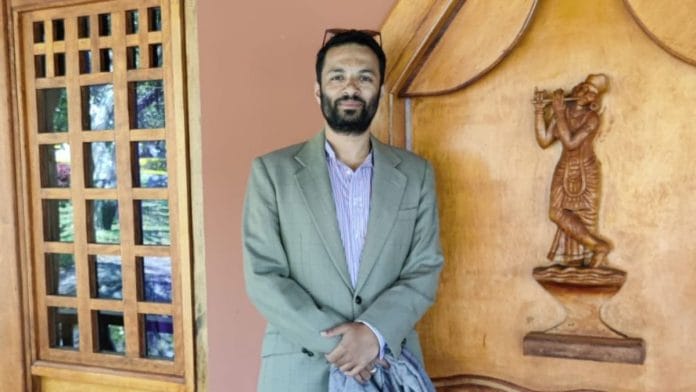New Delhi: Ashoka University Professor Ali Khan Mahmudabad could have avoided use of double-meaning words in his two social media posts on Operation Sindoor that have led to two FIRs against him in Haryana, the Supreme Court observed Wednesday.
Though a bench of Justices Surya Kant and N.K.Singh granted Mahmudabad interim bail in both cases, it did not hold back the investigation. Instead, it directed the constitution of a special investigation team (SIT), asking the Haryana Director General of Police (DGP) to nominate three IPS officers, including a woman officer, as its members.
The IPS officers will not be either from Delhi or Haryana. The committee, it directed, should be headed by an Inspector General Police-rank officer, while the other two officers should be Superintendents of Police.
After going through the posts, the bench observed the petitioner should have used “neutral and respectful language.”
“This is what we call in the law – dog whistling! “Some of the opinions are not offending to the nation as such. But while giving an opinion, if you….” Justice Kant said.
“When the choice of words is deliberately made to insult, humiliate or cause discomfort to other persons, the learned professor cannot have the lack of dictionary words…he could convey the very same feelings in a simple language without hurting others. Have some respect for the sentiments of others. Use a simple and neutral kind of language, respecting others,” Justice Kant told senior advocate Kapil Sibal.
“I couldn’t agree more on this, but there is no criminal intent,” Sibal submitted, arguing the professor did not say anything against a woman in his posts.
The interim bail, the SC said, would be contingent to some conditions on bail bonds for each case. These would be stipulated by the Chief Judicial Magistrate, Sonepat. Mahmudabad was also told to surrender his passport.
Besides, SC restrained Mahmudabad from writing any posts or articles in relation to the social media posts, which are subject matter of the case or from expressing any opinion in relation to the recent terrorist attack or India’s counter-response.
The top court also directed him to join and fully cooperate with the investigation, while specifying his bail was to facilitate the probe.
After the order was dictated, Sibal urged the apex court to restrain registration of further FIRs on the same issue. “Nothing will happen,” Justice Kant orally said, asking Haryana to ensure that.
The bench gave liberty to Haryana to place on record any further incriminating materials they come across during the course of the investigation.
At the outset, the bench accepted that free speech was a fundamental right. But it felt the time chosen by Mahmudabad to express his sentiments over communal flare-ups was not right.
“The country has faced a big challenge. Monsters came all the way and attacked our innocents. We were staying united. But at this juncture…why to gain cheap popularity on this occasion?” Justice Kant said.
Though Sibal agreed that the comments could have waited till 10 May, after the ceasefire was announced, he sought to refute the charges that there was criminality.
At this, the bench retorted: “Everybody talks about rights. As if the country for the last 75 years was distributing rights without duties. Who will follow the duty to respect others?”
The court then turned to Additional Solicitor General S.V.Raju, representing Haryana. It asked him to indicate that portion in the professor’s posts that insulted women army officers.
“The entire projection (of his posts) is that he is anti-war, saying families of army people, civilians in border areas etc., suffer. But some words have double meanings also,” the bench said, adding the bona fides of Mahmudabad’s comment was a subject matter of investigation.
Arrested 18 May, Mahmudabad is in judicial custody.
The professor’s wife is pregnant and is likely to deliver any moment, Sibal said, adding that he has not been to the university campus for close to two months and has been living in Delhi.
The bench, which took note of media reports that talked about a possible protest in the campus by university students, warned that it might initiate action in case any such incident takes place. “We know how to deal with them. These private universities, all sort of elements join here and start doing activities. They are not beyond our jurisdiction,” the bench said.
Ashoka University welcomed the court order. “We are relieved and heartened by Prof Ali Khan Mahmudabad being granted interim bail by the Hon’ble Supreme Court. It has provided great comfort to his family and all of us at Ashoka University,” it said, in a release issued within an hour of the order.
Meanwhile, the National Human Rights Commission (NHRC) has taken suo-motu cognizance of the case and sought a detailed report from the Haryana Police chief within one week.
(Edited by Tony Rai)
Also Read: Even some BJP leaders are stumped by his arrest. All about Ashoka professor Ali Khan Mahmudabad







The Supreme Court’s observations on “elements” in “private universities” is spot on. It is pure unadulterated truth. It exposes the kind of elements these universities harbour and nurture.
Ashoka University must be ashamed of itself. It has become a den of anti-India elements masquerading as “intellectuals” and “scholars”.